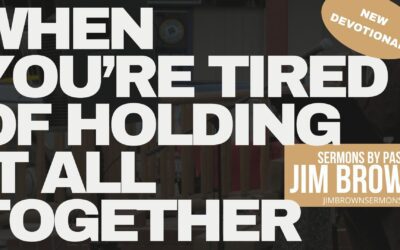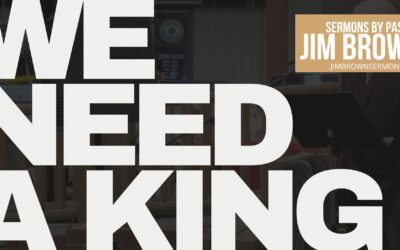December 20, 2024
EP 6: WISE MEN STILL NEEDED | SEEKING THE GOD OF WISDOM
Proverbs, Eccl, Song, Job
Unlocking Life’s Greatest Questions with the God of Wisdom
Ever feel like life’s questions are too big for answers? Dive into the wisdom books of the Bible and discover the God of Wisdom whose truths surpass human understanding. Explore how the fear of the Lord can transform your decisions, relationships, and faith journey.
Sermon Study Resources
Sermon Notes
Your Subtitle Goes Here
Sermon Notes: Wise Men Still Needed | Seeking the God of Wisdom
Introduction
- Theme: The incomprehensible wisdom of God.
- Goal: To recognize that God’s wisdom surpasses human understanding and to seek Him as the ultimate source of wisdom.
- Key Verse: Proverbs 1:7 “The fear of the Lord is the beginning of knowledge; fools despise wisdom and discipline.”
1. The Wisdom of God
- Key Point: God’s wisdom is beyond human comprehension.
- Illustration: Leaving cookies on the table and knowing which child will take them – an example of foreknowledge.
- Application: God’s wisdom teaches dependence on Him for understanding and guidance.
Supporting Scriptures:
- Hebrews 13:8 “Jesus Christ is the same yesterday, today, and forever.”
- Deuteronomy 32:4 “He is the Rock, His works are perfect, and all His ways are just.”
2. Wisdom Books of the Bible
- Books Highlighted: Proverbs, Ecclesiastes, Song of Solomon, and Job.
- Key Point: These books offer practical and poetic insights into the fear of the Lord and daily living.
Proverbs:
- Nature: Optimistic and practical.
- Examples: Proverbs 23:1-2 “Put a knife to your throat if you are given to gluttony” – symbolic, not literal.
- Focus: Wisdom in living a righteous life.
Ecclesiastes:
- Nature: Reflects on the vanity of life and the pursuit of meaning.
- Key Point: Justice, mercy, diligence, and integrity are essential, but earthly benefits aren’t guaranteed.
Song of Solomon:
- Nature: A poetic depiction of romantic love and its importance.
- Key Point: True fulfillment comes from long-term, God-centered relationships.
Job:
- Nature: Explores suffering, faith, and God’s sovereignty.
- Key Point: Job’s story illustrates the importance of trusting the God of Wisdom even in trials.
3. Fear of the Lord
- Definition: A deep respect for God’s law and character.
- Illustration: An electrician’s healthy respect for electricity – not fear, but awe and care.
- Application: Living with the fear of the Lord leads to wisdom and understanding of His ways.
Supporting Scriptures:
- Proverbs 1:7 “The fear of the Lord is the beginning of knowledge.”
- Deuteronomy 6:2 “Fear the Lord your God, as long as you live.”
4. God’s Justice and Righteousness
- Key Point: God’s justice requires sin to be punished; His righteousness ensures perfect fairness.
- Illustration: The pizza example – someone must pay the price for sin, and Christ paid it for us.
- Application: Trust in Christ’s sacrifice for righteousness; we cannot achieve it on our own.
Supporting Scriptures:
- Romans 3:25 “God presented Christ as a sacrifice of atonement.”
- 2 Corinthians 5:21 “God made Him who had no sin to be sin for us.”
5. Wisdom for Everyday Life
- Proverbs: Provides practical advice for living in alignment with God’s design.
- Illustration: A worn-out wrench used improperly – we are designed to live God’s way.
- Application: Seek God’s wisdom daily to live a life set apart for His glory.
Supporting Scriptures:
- Proverbs 23:17 “Do not let your heart envy sinners, but always be zealous for the fear of the Lord.”
- Ecclesiastes 12:13 “Fear God and keep His commandments, for this is the duty of all mankind.”
6. Trusting the God of Wisdom in Trials
- Illustration: Job’s suffering and questioning God.
- Key Point: God’s answers are rooted in His sovereignty, not human understanding.
- Application: When you can’t trace God’s hand, trust His heart.
Supporting Scriptures:
- Job 42:1-6 “Surely I spoke of things I did not understand, things too wonderful for me to know.”
- 2 Corinthians 4:17-18 “For our light and momentary troubles are achieving for us an eternal glory.”
Conclusion
- Call to Action: Seek the God of Wisdom in every aspect of life. Depend on Him for understanding, righteousness, and guidance.
- Final Thought: True wisdom starts with loving and fearing God, trusting in His ultimate plan even when it’s beyond our understanding.
Closing Prayer
Heavenly Father, we come before You in awe of Your wisdom and grace. Teach us to trust You more deeply and to seek Your guidance in all we do. May we glorify You through our lives and grow closer to You daily. In Jesus’ name, amen.
Bible Verses
Your Subtitle Goes Here
Bible Verses Cited:
Hebrews 13:8 (NIV)
“Jesus Christ is the same yesterday, today, and forever.”
Proverbs 1:7 (NIV)
“The fear of the Lord is the beginning of knowledge, but fools despise wisdom and instruction.”
Deuteronomy 6:1-2 (NIV)
“These are the commands, decrees and laws the Lord your God directed me to teach you to observe in the land that you are crossing the Jordan to possess, so that you, your children, and their children after them may fear the Lord your God as long as you live by keeping all his decrees and commands that I give you, and so that you may enjoy long life.”
Deuteronomy 32:4 (NIV)
“He is the Rock, his works are perfect, and all his ways are just. A faithful God who does no wrong, upright and just is he.”
Romans 3:25 (NIV)
“God presented Christ as a sacrifice of atonement, through the shedding of his blood to be received by faith. He did this to demonstrate his righteousness, because in his forbearance he had left the sins committed beforehand unpunished.”
Romans 3:10 (NASB)
“As it is written, ‘There is none righteous, not even one.’”
Matthew 5:20 (NASB):
“For I say to you, that unless your righteousness surpasses that of the scribes and Pharisees, you will not enter the kingdom of heaven.”
2 Corinthians 5:21 (NIV)
“God made him who had no sin to be sin for us, so that in him we might become the righteousness of God.”
1 Peter 3:18 (NASB)
“For Christ also died for sins once for all, the just for the unjust, so that He might bring us to God, having been put to death in the flesh, but made alive in the spirit.”
Proverbs 23:17 (NIV)
“Do not let your heart envy sinners, but always be zealous for the fear of the Lord.”
Ecclesiastes 12:13 (NIV)
“Now all has been heard; here is the conclusion of the matter: Fear God and keep his commandments, for this is the duty of all mankind.”
Job 42:1-6 (NIV)
“Then Job replied to the Lord:
‘I know that you can do all things; no purpose of yours can be thwarted.
You asked, “Who is this that obscures my plans without knowledge?”
Surely I spoke of things I did not understand, things too wonderful for me to know.
You said, “Listen now, and I will speak; I will question you, and you shall answer me.”
My ears had heard of you but now my eyes have seen you.
Therefore I despise myself and repent in dust and ashes.'”
2 Corinthians 4:16-18 (NIV):
“Therefore we do not lose heart. Though outwardly we are wasting away, yet inwardly we are being renewed day by day. For our light and momentary troubles are achieving for us an eternal glory that far outweighs them all. So we fix our eyes not on what is seen, but on what is unseen, since what is seen is temporary, but what is unseen is eternal.”
Sermon Slides
Your Subtitle Goes Here
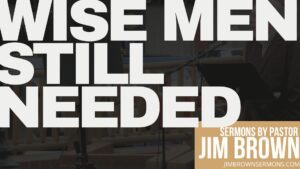

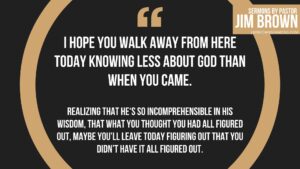
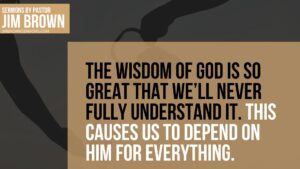
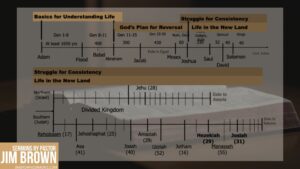
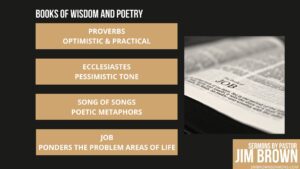
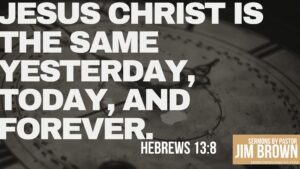
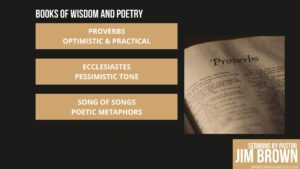
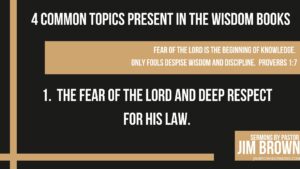
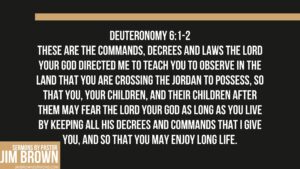
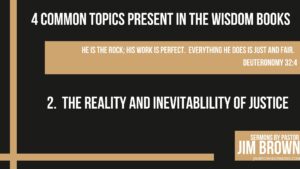

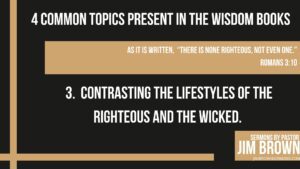


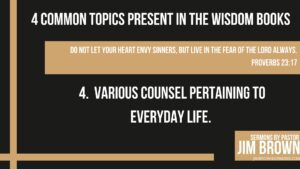
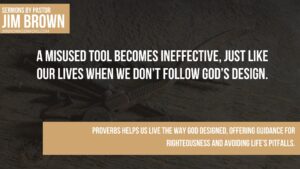
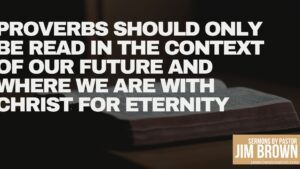
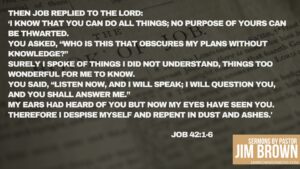

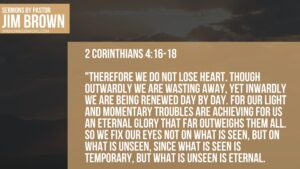
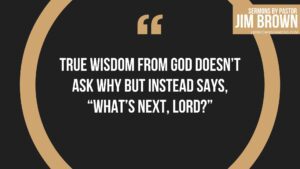
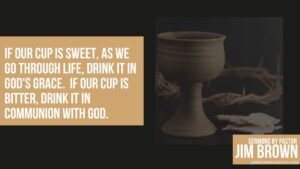

Related Song List
Your Subtitle Goes Here
Recommended Resources
Your Subtitle Goes Here
Books
- “The Wisdom Books” by Robert Alter
- A scholarly translation and commentary on Job, Proverbs, and Ecclesiastes that explores their literary and theological depth.
- “The Fear of the Lord Is Wisdom” by Tremper Longman III
- This book focuses on understanding the wisdom literature in its biblical context, including the themes of the fear of the Lord and God’s justice.
- “The Problem of Pain” by C.S. Lewis
- Offers insights into suffering and God’s sovereignty, complementing the discussion on Job and the wisdom of God.
Bible Studies and Devotionals
- YouVersion Bible App – Wisdom Plans
- Plans like “The Fear of the Lord“ or “Proverbs for Wisdom“ provide daily devotions and scripture reading relevant to the themes of this sermon.
- “Job: A Story of Unlikely Joy” by Lisa Harper
- A study that focuses on Job’s journey of suffering, wisdom, and trust in God’s plan.
Articles and Blog Posts
- Desiring God – “The Beginning of Wisdom” by John Piper
- Explores what it means to fear the Lord and how it leads to true wisdom and understanding.
Podcasts
- The BibleProject Podcast – Wisdom Series
- Episodes delve into the themes of Proverbs, Ecclesiastes, and Job, explaining their relevance and how they interconnect.
*This contains affiliate links, and Sermons by Pastor Jim Brown may earn a small commission from qualifying purchases. All proceeds go directly toward supporting the maintenance and operation of the website. Thank you for your support!
Sermon Transcript
Your Subtitle Goes Here
Sermon Title: Wise Men Still Needed | Seeking the God of Wisdom
I talk about God being all knowing and his predestination and all these different things about God and his wisdom that we don’t understand. There are some things we can kind of get a handle on, and that is as far as God for knowing, kind of understanding what’s going to be ahead and different things like that. It’s sort of like when you leave cookies out on the table. If we left chocolate cookies out on the table at our house, I for knew which daughter was going to take something, okay? I didn’t have to tell her or anything else or say, you just know that one daughter’s going to take ’em and the other one’s not. And it was that way this morning when I left this on the thing, I really knew Rich couldn’t resist this. I knew he’d pick it up, but we’ll hear more about it later.
But the wisdom of God is what we’re talking about this morning and something that I hope now to just let you know the punchline here. So I hope you walk away from here today knowing less about God than you came, realizing that he’s so incomprehensible in his wisdom that what you thought you had all figured out, maybe today you’ll leave figuring out you didn’t have it all figured out because that’s the wisdom of God. It is so great and so incomprehensible that we’ll never get there. And that’s a good thing because it causes us to depend on him and to come to him time after time and time and getting filled with his wisdom. So we’re looking at the books that are often called Wisdom books. Well, I’ll show you where they fit in the timeline here. Basically the whole bottom where it says struggle for consistency into new land, that’s what we’re doing.
We’re filling in that time. And so the beginning was the basics for understanding life. That was about the fall and sin, and I don’t know if you remember this, but there was the talk about the two trees and how important that is to realize that the choice at the time was the choice between life and the tree of the knowledge of good and evil, which represented death. So the tree of life and the tree of knowledge of good and evil. And as long as they chose the tree of life, they didn’t need to bother with knowledge, they’d just go to God for everything they needed to understand about good and about evil. And God would give them direction day by day, moment by moment of what they needed to know. But when they chose to go their own way and go to the tree of the knowledge of good and evil, that was good and evil.
So it’s not a bad tree, it’s just that there was overwhelming information at that point because we cannot fully understand all that is good and all that is evil and how they combine each other. And we know in our society today they can come out with some slick new device that will make our life easier and somebody will take that and use it for evil. So there’s really no distinctions, and that’s where this wisdom of God becomes so important to go back to the tree of life that we ended up going back to as we saw in that message that the tree of life is still there for us and it’s in Jesus Christ. And as we go to him, we have wisdom. There’s no clear division in the Bible between the books of wisdom and the books of poetry, for instance that we studied last week.
It’s kind of a false dichotomy, but theologians like those, they like to separate things up and kind of chop ’em up. But the books of wisdom are usually called Proverbs, Ecclesiastes, song of Solomon and Job. There’s poetry within those and there’s wisdom in other books besides those. So you can’t just draw the line and say, okay, these books are wisdom books, but that is generally how they’re categorized. Proverbs, Ecclesiastes Song of Songs or Song of Solomon and Job. So wisdom and poetry go together and so does wisdom in law, so does poetry in law. They all intermingle. One thing that’s important though is as we go through this, as we’re going back to Hebrews 13, eight, that God is the same God yesterday, today and forever, that he hasn’t changed that as we read any wisdom of God, we realize it in the context of the rest of the Bible and that specific scriptures within what we would say as the wisdom books must be interpreted in the light of the rest of scripture.
So you can’t just separate it out and say, well, God is different here than he was there. No, it’s got to be interpreted in the light of the whole Bible. So we’re going to look at Proverbs first a little bit about Proverbs. And one thing about Proverbs is that basically they’re optimistic and practical. Okay? Optimistic. Most cultures have these witty little sayings, right? Things to kind of help you get through life. And Sherry Reil reminded me of one last week from Phyllis Diller, and that is the housework never killed anyone, but why take chances, right? Things like that. My dad had one that he used to talk about all the time. He says, I’ve been rich and I’ve been poor and I’d rather be rich.
Those types of little sayings that we come up with help us put a handle on life. Well, the witty sayings in Proverbs go beyond that. They’re more than just observations about life, but they talk about a commitment to God that’s always in there, good and evil, and it talks about life’s pitfalls. Those are all important matters to get ahold of in our lives. And there’s a lot in Proverbs that you can’t just take literally. And I know we like to say that we interpret the Bible literally here, but there’s things you can’t do. Like in Proverbs 23, 1 and two, it says, when you sit down to dine with a ruler, consider carefully what is before you and put a knife to your throat. If you’re our man of great appetite, okay, you don’t want to take it literally, I hope.
Then you got the book of Ecclesiastes, which is also considered the wisdom book, but it’s more like a story-like form. It’s not as many witty little sayings. The other side of the coin is it’s pessimistic in tone. It’s kind of a downer at times. Proverbs tells us that wise living results in righteousness and diligence at work will work out to our benefit. And Eccles, the ASEs points out that these things don’t always work out for us, that you do the right thing and it turns around and stabs you in the back. So it’s not that these two books contradict each other. The bottom line for both of them is the same that we are to practice justice, mercy, diligence, loyalty. We’re supposed to have good worth work ethics. We’re supposed to have integrity because it’s the right thing to do because God’s called us to do that and it honors him not because of the earthly benefits, but Proverbs does point out that oftentimes the earthly benefits are there in doing it.
Then you got the Song of Songs and a lot of people don’t know what to do with that. A lot of Bibles call it the Song of Solomon because they just automatically ascribe that it’s about Solomon or written by Solomon. There’s debates on that. People don’t always agree on it, but I don’t know if that’s as important as what it says and that it’s in our Bible and it’s there for a reason. It’s a love poem. It describes a passion between a starstruck shepherd and his wife who’s just spellbound with him. If it is referring to Solomon, one would wonder where this came from. He did ask for wisdom, great wisdom from God, and that wisdom was in order to judge the people, right? He says, I want to be able to judge the people rightly, and I want all the wisdom. You can give me God to do that.
Well, he obviously didn’t use it in his own life. We saw last week that he had several hundred wives and concubines and all kinds of things. So I questioned how he could have written this about his own life, but he may have written it on another level as wishing it was his life with his great wisdom that the mistakes he’s made and saying, boy, I wish I had stuck with one person all of my life because this would’ve been the benefit. You could work at a great relationship over time. And that’s the wisdom of the Song of Solomon that two people when they work at it, can have a wonderful relationship, but it takes work and hard work at times, and that’s what Song of Solomon’s trying to tell us is that work at it, keep it up. And you know what? The romance will be there.
It will be there. God designed romance and romance is a good thing, but it won’t happen when we’re self-centered. And so as we go through the song of Songs, we want to remember that God is not against romance. He invented it. And I think we’ll experience it more and more as we’re together more and more and work at it more and more. That’s what he’s trying to say. So that true fulfillment is being a one partner lover for life, and anything else will bring short-term pleasure, but in the long-term will be searching, it will bring about loneliness. So to look at relationships as long-term and not for immediate gratification, there’s four common topics that are presented in these wisdom books. Fear of the Lord is the first one. How important it is that when we approach relationships, when we approach these witty little sayings, when we approach anything that God is directing us in our life, that the fear of the Lord and deep respect for his law has got to be a given.
If all we’re concerned about is us, we can memorize Proverbs and it won’t do us any good, but if we want to get close to God and see what it is he’s trying to teach us, that’s what’s important. And so we need to have a respect for his laws and his direction in our life. And to some people, the books of like Proverbs seems unrelated to the law. They say, well, the law is one thing. Then you read the proverbs and they say something else, and really what they are is they are a greater definition to Deuteronomy. For instance, the centrality of the law was a given in Israelites life that they knew the law, they understood it, they studied it. And so therefore the Book of Proverbs doesn’t talk about the sacrificial system, for instance, very much. It doesn’t talk about the covenant God has made with his people at all.
And you say why that’s so key to their living. Well, it was assumed they already knew that stuff. So now assuming about what you already know about Deuteronomy and the law, let’s add to it and put some meat to it as to why it’s written the way it is. So it assumes you already know about the Torah, which are the first five books of the Bible written by Moses. The phrase fear of the Lord is the cord that ties them together because that’s often used also in the Torah, the fear of the Lord. And so when it says fear of the Lord, it just spurs people back to thinking again in that it’s a summary statement to say, go back to the law. That’s what the fear of the Lord means. Go back to what the law says, understanding that, and then we will understand what Proverbs is trying to tell us.
So in Proverbs one, seven, it says, fear of the Lord. Fear of the Lord is the beginning of knowledge only fools despise wisdom and discipline. So it ties that together with the law, if you ignore the law, you will not be able to experience God’s wisdom. So fear the Lord is the only way to begin to live a wise life. But if you don’t fear God, if you don’t have a healthy understanding of who he is, then we won’t be wise. We cannot get there. That term is often tied to expressions. Like when we fear the Lord, we’ll walk in his ways, we’ll follow his commands, we’ll serve him we’ll, love him, we’ll follow him anywhere. That’s what it means to have wisdom and to fear the Lord.
It would jog their memory. It’d be like if I would say to Lynn, will you cook dinner? Well, it’s assuming she knows how to boil water. It already assumes she knows how to do a lot of the other things that are specific to cooking. So Proverbs assumes a lot of the things are already understood as it gives us direction. In Deuteronomy, it says, these are the commands of the decrees of the Lord that your God has directed me to teach you, to observe them so that your children and their children after them may fear the Lord your God. So you want to teach the basic statutes of God, the first five books to the children so that they learn a healthy fear of the Lord. I think of it like an electrician has to have a healthy fear of electricity. That doesn’t mean he’s afraid of it.
We shouldn’t be afraid of God, but an electrician has a healthy fear of electricity so that he doesn’t get killed, right? Well, so it is with us. We have to have a healthy fear of God to understand his awe, his power, his judgment, his character in so many different facets of our life that we live with, respect for him and what he said, and believing that what he says is true. So that comes to the next point of the reality and inability. I got the words today of justice. It spelled up there, right? You got it when I wrote that down, I looked through thesaurus looking, what’s a better word for this? There’s got to be something, but that one fits, so you just got to stick with it. But in English, justice and righteousness are two different words, but in the original languages of the old and the New Testament, they’re of the same root words and they speak of one attribute of God.
So when we think of righteousness and we think of justice, that’s one attribute of God so that he always acts in accordance to what is right. That’s what it means. God always acts in accordance to what is right. In Deuteronomy 32, it says that he is a rock. His word is perfect, his work is perfect. Everything he does is fair. You see, that’s God. Now, do you believe that? Do you, all the time you ever question it, do you ever wish some of God’s rules were different? See, as a result of God being perfect in his justice, he treats people, it’s necessary for him to treat people according to what they deserve. Therefore, it’s necessary that God punishes sin. That would be just, that’s what righteousness is. Perfect righteousness means perfect justice, and so God’s got to punish sin. And if God doesn’t punish sin, well then that would mean that he’s unrighteous, right?
Because for instance, if I stole something, I have to repay that, or shouldn’t that have to be paid for? I did something wrong. Now, if the law were to say, well, it’s okay for Jim to steal things, but nobody else is that just is that righteous? So is it right for any one of us to feel like we can get away with sin? No. See, God is perfect in his justice and in his righteousness. So sin has got to be punished. This is why Paul says in Romans 3 25, it says, Jesus took the punishment for our sin and he took the anger of God against sin that we’re made right in God’s eyes because of what Jesus has done, he took that punishment that we deserve because God is righteous. He cannot change. So when we understand what the Proverbs say, we have to understand that also God is perfect in his judgment and judgment will come, and if we don’t turn to God in repentance, we will suffer that judgment.
Not Jesus, but he took it for us. If we allow him to, in a small way, it’s sort of paying a bill for somebody. We went to about, I know when our kids were teenagers, so that was 15 years ago, we went to a pizza place and there was a whole group from the youth group there, probably about eight kids having pizza. And when we were all done, we went and told the people at the counter we wanted to buy their pizza for the youth group there, and they didn’t know it. So they figured at the end of the time, they were all going to have to figure out how to pay the bill and stuff like that. Well, that’s sort of how it is with God, is that the kids owed for that pizza, didn’t they? I mean, they consumed it, but it was taken care of by somebody else.
Well, so it is with us. We’ve sinned and the payment is due. Now they could have chosen and said, well, no, no, we ate the pizza. We need to pay for it and not accept it. And that’s what it is. When we try to work our way to God, when we say, no, I did wrong. I’ve got to pay for this. I’m going to do good. I’m going to try harder to please God, I’ll measure up somehow we’re not taking what Jesus did for our sin and allowing him to for the payment. So when Christ died to pay the penalty for our sins, it showed that God was truly just that he did punish sin. And we don’t have to be punished, but we will be if we don’t follow his ways and follow him. God did not want to punish people. No, but sin must be punished.
That’s what grace and mercy is all about, to understand that God does not give us what we deserve, but then goes ahead and gives us what we don’t deserve, and that is eternal life. So those who love the Lord and follow after him have their sins paid for by Jesus. Then also in the wisdom books is the contrasting lifestyles of the righteous and the wicked people. You’ll see that over and over again, the righteous, the wicked, the wise, the foolish, on and on for proper understanding. We can look at righteousness. The quick definition for it is right living. That’s how a lot of us look at it is, okay, I’m going to live right, I’m going to be righteous. And scripture makes it clear again that we are incapable of being righteous, that we can’t get there. We can’t pull it off. In Matthew five 20 it says, for I say, unless your righteousness surpasses that of the scribes and Pharisees, you will not enter the kingdom of heaven. In Romans three, tenet says, it is written, there is none righteous, not even one.
He made him who knew no sin to be sin on our behalf that we might become the righteousness of God. So it’s through Jesus Christ. We are righteous. It’s not righteousness on our own, but it’s only the righteousness we have because of Christ. Go back to the breast plate of righteousness. It’s Christ we’re putting on. When we put on the armor of God, it says in one Peter, for Christ died for sins, once for all, just for the unjust that he might bring us to God. That under the law we had to measure up to a standard. But now we no longer have to measure up to a standard. Christ has measured up to us. We come to him. We are children of God. So we put our faith in Christ for all things, and that’s where our righteousness comes from. Every time we choose to trust Christ in a situation we are experiencing righteousness.
And then the fourth thing is that there’s a lot of different counsel pertaining to everyday life within the Wisdom Books, Proverbs and the other books of wisdom aren’t a substitute to the law. Like I mentioned. They fill it in. So you don’t throw the law away, you fill it in. For instance, the law was very, very specific about the sacrificial system. God gave instructions about how the people should live in order to look set apart. Well, that’s what Proverbs does with us also, it just shows us that once we’re living according to God’s ways, once we are members of His kingdom, we will be set apart. We’re different. We need to be different. And if we aren’t, we’re going to experience the same problems that everybody else in the world will experience. So the books of the law are the same message, but just a different approach.
Proverbs five and six gives some practical examples and consequences of what happens when we don’t follow God’s laws for adultery. For instance, the law says don’t commit adultery. But then Proverbs five and six fills in the blanks as to the practical aspects of that. See this? I don’t know how well you can see it. Do you see anything missing? There’s a big hole in the, usually it’s got a little thumb wheel. My dad gave me this when I was 10 years old and a go-kart all in pieces. So this was my tool that was my go-kart, and it took me a couple years to get that thing running, but this doesn’t work anymore. I keep this in my toolbox to remind me. This side is all flattened out, completely flattened out. The little thing that goes in and out there, you can’t hardly tell it exists.
And I’ve beat this thing up against all kinds of things to the point where the little roller has jumped out. I use this in a manner it was not recommended for using, okay, I use this more as a hammer than a wrench. In fact, I still do occasionally in my toolbox right on top just to remind me to use my tools the way they were designed. So I’ve got this, well, that’s what the Proverbs do. They help us see to use our lives the way God’s designed it. Otherwise, this is what’s going to happen. We’re going to become a useless tool in the box just banging our head up against the wall basically.
And so it is that the Proverbs and the wisdom books are there to help us understand how we’re knit together so that we live the way we’re designed in order to honor God with our lives. The whole idea that God brought the people of Israel up and wanted them to be a nation was to be an example to the world of the glory of God. Well, they kept failing at that, and they kept on falling into the ways of the world and continually experiencing the consequences for that. We have replaced Israel in that adventure really, of representing God to the world. And as Christians, the more we do things our way and insist on doing things that we don’t feel God got control over, that we have a better understanding of our life than he does to that degree, we’re just going to be set aside just like the nation of Israel and not used to glorify God in this world we live in.
We also understand in the books of wisdom that in Proverbs 23, it says, don’t let your heart envy sinners, but live in the fear of the Lord always. Yes, sinners get ahead sometimes, but we’re not to envy them because ultimately we’re to look beyond that to our future, that our future will take us well beyond this life. And as we live life that way, we understand that life doesn’t end in physical death, and we’ll understand that sin doesn’t ever deliver what it promises. So Proverbs encourages us to live very positively in the light of divine revelation and the great future we have. So don’t focus only on today and look to the Proverbs to say, okay, I want everything and I want it. Now, how am I going to do it? By living right, we can take the Proverbs and develop a lot of seminars on how to get ahead in life, and they’ll basically work.
They will, but they won’t necessarily get you any closer to God. It starts with a love for God. And as we love him, we want to apply the Proverbs to our life in order to glorify him. But if it’s still about me, they still won’t take us into future glory, and that’s where we’re headed as Christians. So Proverbs should only be read in the context of our future and where we are with Christ for eternity. In Ecclesiastes and Job, we are warned against demanding a full explanation from God about life. It’s easy to thank God when things are going good, isn’t it? But how about when things aren’t going so good? How about when God doesn’t do what we want? It’s not so easy to thank him, and you can ask Job about that. You read the Book of Job and it’s just like Ecclesiastes in many ways.
It ponders the problem areas of life. Is there anybody who will worship God for who he is rather than what he gives? That’s the questions that’s asked of Satan to God. Is there anybody, God who will worship you? Or is it just that you’ve bought everybody off? And God says, look at Job, why? It makes me shudder a little bit that God would say, okay, check him out, Satan, check him out. He loves me. And Satan challenges God and says, oh, you’ve bribed him. You’ve given him riches. You’ve given him a good life. You’ve given him a good family. That’s why he serves you. You let me take away all that stuff and he’ll curse you to your face, God. And shortly after that, his entire empire collapsed. His children were killed, his healthy body was taken away. He became a rage of boils all over his body.
Where did this torment come from? He had no idea. He didn’t know what was going on in the heavenlies. Where would he turn for help? Well, his wife was a lot of help. She said, why don’t you curse God and die? How about his friends? His friends came and said, boy, you must have really messed up. You really sinned, and that’s why you’re suffering this way. You must have been pretty bad to get it so bad. And he says, basically, well, with friends like you who needs enemies, right? His head hurts. His body hurts. His soul hurts. His heart is aching, and he turns to God and says, what’s happened? Why is this happening to me? He’s demanding an explanation from God. Do we ever do that? Demand an explanation from God? Why me? Why is this happening? God answer to me. Well, God answers, but he doesn’t answer with answers. He answers with questions. I’m going to play a little track here about some of those questions.
Yours like a man, answer me Now if you can. Where were you when I made all you see? If you know them, come tell it to me As the morning been at your command and you made the Don come. When you plan which way to the dwelling of light and just where is the home of the night? Would you try to tell God what should be? Speak up. If you know more than me with a creature, now rise to my height. Tell me what I do is not right. Stand up and majestic in glory to their grave and perhaps your own life you could save. So convert up yours like a man. And now if you can exalt yourself now in my sight, condemn me so you can be right, ex yourself now in my sight and condemn me. So you right Lord, behold, I’m nothing but us in your presence. No man can be just proud. Words came before you. Now, I treble in terror and fear as a fool. I have on Lord no more as I knee throne, I’d heard just a whisper, a trace, all is changed when we meet face to face. Such things I did not understand. They’re too great for the mind of a man. My words have been foolish and rash. I repent in the dust and the ash. All my words have been foolish, and I repent in the, and
It was so that after the Lord had spoken these words unto Joel, the Lord said to PHAs the Timon, my wrath is kindled against you and against your two friends, or you have not spoken of me. The thing that is right as my servant job has. And the Lord restored job’s fortunes when he for his friends. Also, the Lord gave job twice as much as he had before after this job lived 140 years and saw his sons and his sons sons, even four generations. So Job died being old and full of days,
You might say that job lifted his hands and said, enough, I understand he’s gotten the point. So what’s the point? God owes no one anything does. He doesn’t have to give us reasons, no explanations, nothing. And even if he gave him, do you think we’d understand? Do you think we’d ever understand giving up our own child for somebody else to sacrifice them? Is there wisdom that’s so much greater that we just can’t comprehend it? How many of us would be willing to do what God has own can do for somebody else? We can’t understand God’s ways and to demand an answer will get us nowhere. God is God. He knows what he’s doing. Someone has said that when you can’t trace God’s hand, trust his heart. He loves us. Christ proved that he loves us, but we don’t always understand his love. The Apostle Paul addressed the questions of disappointment with God, with the Corinthians.
He had incredible hardships, didn’t he? And in the midst of that, he said he did not lose heart. That though we’re wasting away outwardly, inwardly we’re being renewed day by day. As Paul said, we have these light and momentary afflictions. Could you imagine that after being beaten, stoned, whipped, shipwrecked, all the things he went through, calling him light and momentary afflictions, they’re achieving for us an eternal glory that far outweighs everything else. So we fix our eyes, not on what is seen, he says, but fix our eyes on what is unseen true wisdom from God. Doesn’t ask why. It says, okay, what’s next? Where are we going? I’ll follow Paul endured trials, and he died as a martyr job. He endured trials too, and he received a fine reward. So what’s the formula? What God trying to say here? God is trying to say, it doesn’t matter what happens in this life, his grace is sufficient.
So in the meantime, he wants us to know that if our cup is sweet, as we go through life, drink it. And God’s grace, if your cup is bitter to drink it in communion with God, with Jesus Christ, let’s pray. Heavenly Father, all we can do is ask for wisdom. Understanding to know your ways just a little bit more every day. Your love for us is incomprehensible. But Lord, that if we could comprehend it for the moment, for the season that we’re going through, whether it be a season of joy or a season of pain, Lord, that we turn to you and say, what’s next? Lord, I want to follow you through whatever’s going on and give you the glory so we praise you for who you are, not just what you can do for us, Lord, but we thank you that you’ve done the ultimate in sacrificing your son Jesus Christ, so that we can spend eternity with you as your children, knowing the splendor of the God of universe. In Jesus name we pray, amen. And we’ve got a message what to tell others, don’t we.
Original Sermon Date: 12/18/05
© 2024 Sermons by Pastor Jim Brown www.jimbrownsermons.com All rights reserved.

WISE MEN STILL NEEDED: SEEKING THE GOD OF WISDOM
In a world full of complexity and constant noise, the pursuit of wisdom has never been more critical. True wisdom, however, does not come from human intellect or worldly philosophies. Instead, it comes from seeking the God of Wisdom, whose understanding is beyond our comprehension. Let’s explore the profound truths found in the Bible’s wisdom books, uncovering practical insights and eternal truths that guide us toward a life rooted in faith, humility, and trust in God.
The Incomprehensible Wisdom of God
“Are you ready to get real about your faith?” This question, posed at the start of the sermon, hits at the core of our spiritual lives. To Be Real with God is to embrace authenticity—not hiding behind facades but bringing every emotion, joy, and struggle to Him.
In the same way that a heartfelt conversation deepens a human relationship, being real with God strengthens our connection with Him. Faith isn’t about perfection; it’s about honesty. As Psalm 22:1 expresses, “My God, my God, why have you forsaken me?” David’s cry isn’t a lack of faith—it’s a profound trust that God can handle his rawest emotions.
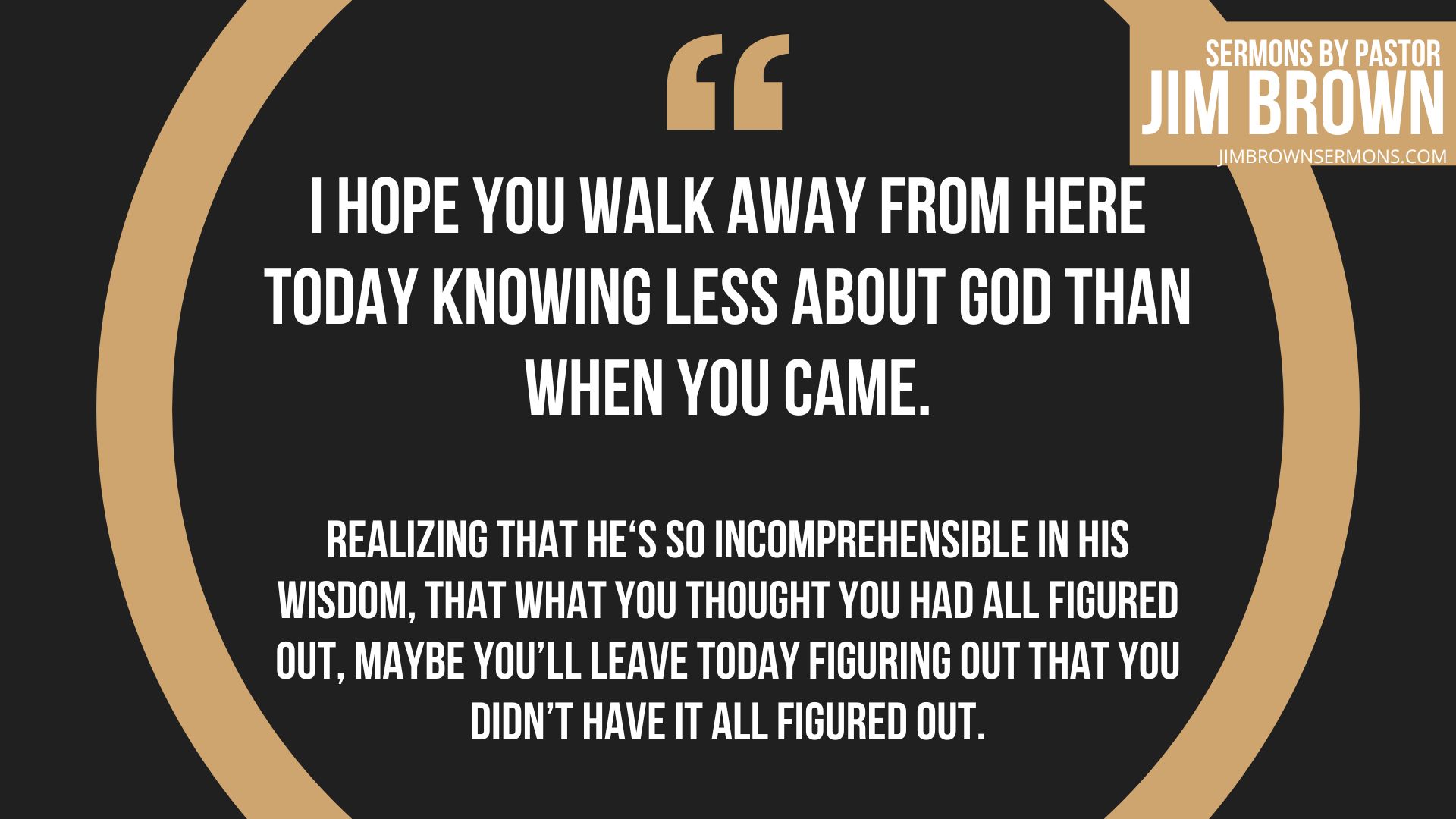
Wisdom Books of the Bible: Foundations for Living
The wisdom books of the Bible — Proverbs, Ecclesiastes, Song of Solomon, and Job — offer timeless guidance. These texts are not merely collections of ancient sayings but are divinely inspired resources to navigate life’s complexities.
Proverbs: Practical and Optimistic Wisdom
Proverbs teaches that wise living often leads to positive outcomes. Through pithy sayings and practical advice, it underscores the importance of righteousness and diligence.
“The witty sayings in Proverbs go beyond observations about life. They reflect a commitment to God and warn of life’s pitfalls,” Pastor Brown shared. For example, Proverbs 23:17 says, “Do not let your heart envy sinners, but always be zealous for the fear of the Lord.”
Ecclesiastes: The Search for Meaning
In contrast to Proverbs, Ecclesiastes presents a sobering view of life’s uncertainties. It acknowledges that righteous living doesn’t always lead to immediate rewards. Yet, the overarching message is clear: living with integrity and fearing the Lord remains our ultimate purpose.
“It’s not about earthly benefits but about honoring God,” Pastor Brown reminded us. Ecclesiastes 12:13 echoes this sentiment: “Fear God and keep his commandments, for this is the duty of all mankind.”
Song of Songs: God’s Design for Relationships
The Song of Solomon celebrates the beauty of love and commitment within God’s design. Pastor Brown observed, “True fulfillment comes from a one-partner lover for life, emphasizing long-term relationships over immediate gratification.” This wisdom applies not just to marriage but to all relationships built on mutual respect, effort, and God-centered love.
Job: Trusting God in Trials
Job’s story illustrates the challenges of trusting God when life doesn’t make sense. Despite his suffering, Job acknowledged God’s sovereignty: “Surely I spoke of things I did not understand, things too wonderful for me to know”(Job 42:3, NIV). This wisdom invites us to trust the God of Wisdom even when we can’t see His plan.

The Fear of the Lord: The Foundation of Wisdom
Central to all wisdom is the fear of the Lord — a reverent awe of God’s holiness, justice, and love. Pastor Brown likened it to an electrician’s respect for electricity: “It’s not about being afraid but having a healthy understanding of its power.”
The Bible consistently ties wisdom to the fear of the Lord, as seen in Proverbs 1:7 and Deuteronomy 6:2: “Fear the Lord your God, as long as you live” (NIV). This fear compels us to live in alignment with God’s commands, fostering humility and dependence on Him.
God’s Justice and Righteousness
Another key theme in the wisdom books is the perfect justice and righteousness of God. Pastor Brown explained:
“God always acts in accordance with what is right. His justice requires sin to be punished, but His grace provides a way through Christ’s sacrifice.”
Romans 3:25 affirms this truth: “God presented Christ as a sacrifice of atonement, through the shedding of His blood”(NIV). This duality of justice and mercy is central to understanding God’s character and our need for salvation.
Practical Wisdom for Everyday Life
The wisdom books not only address grand theological themes but also offer practical counsel for daily living. Pastor Brown illustrated this with the analogy of a misused tool:
“Proverbs helps us see how to use our lives the way God designed, lest we become a useless tool in the box.”
This guidance covers everything from relationships to work ethic, reminding us that God’s wisdom applies to every aspect of life. Proverbs 5-6 provides practical warnings, such as avoiding adultery, and highlights the consequences of straying from God’s design.
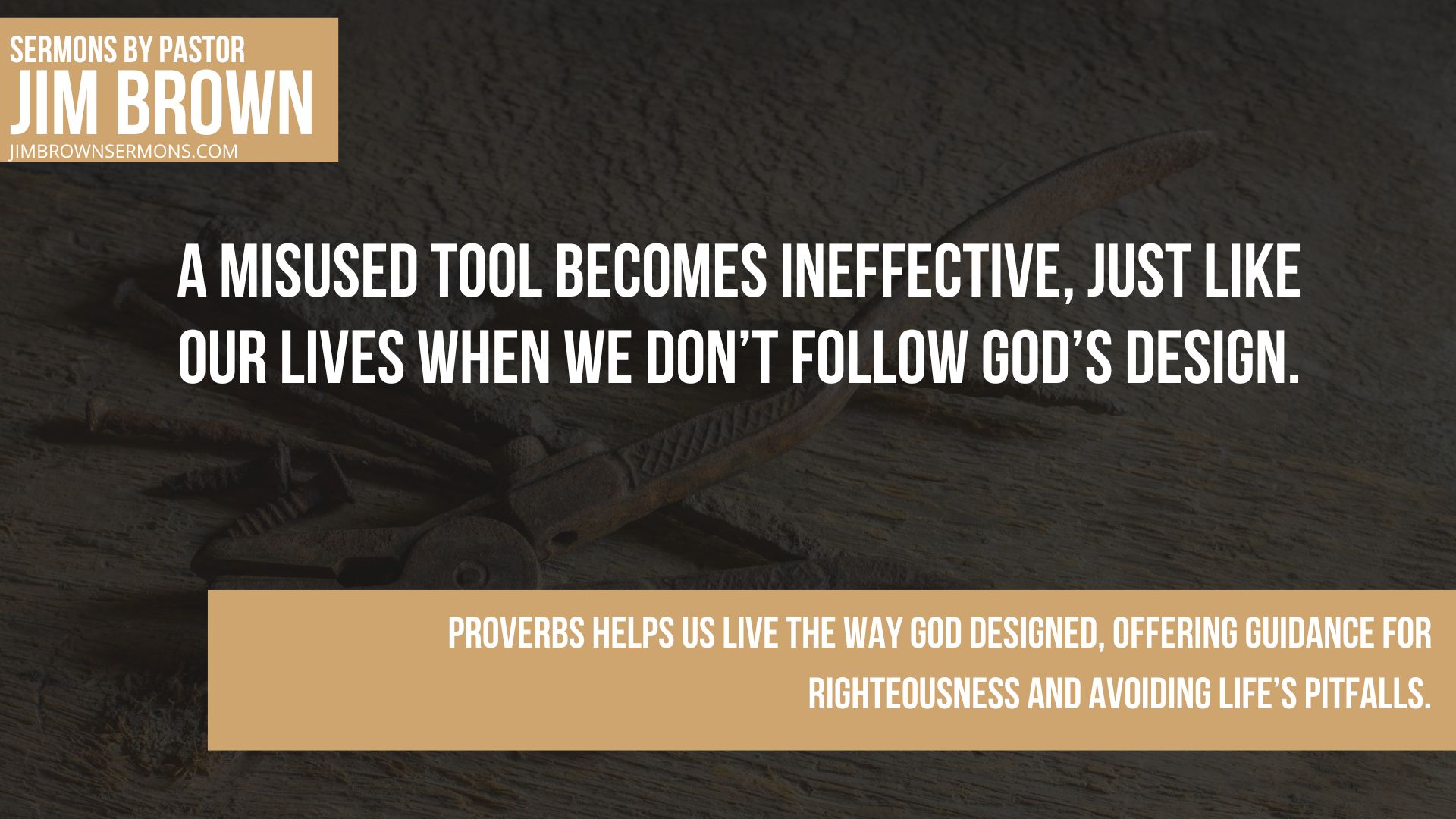
Trusting the God of Wisdom in Trials
Life’s hardships often challenge our trust in God. Job’s story, as well as the Apostle Paul’s endurance, reminds us that true wisdom doesn’t demand answers but asks, “What’s next, Lord?”
2 Corinthians 4:17-18 offers comfort: “For our light and momentary troubles are achieving for us an eternal glory that far outweighs them all. So we fix our eyes not on what is seen, but on what is unseen” (NIV).
When trials come, we must trust the God of Wisdom, knowing that His grace is sufficient and His plans are perfect.
Living as Biblical Wise Men
To live as Biblical wise men, we must:
- Seek God’s wisdom daily through prayer and Scripture.
- Fear the Lord and align our lives with His commands.
- Trust His justice and righteousness, even when life is hard.
- Embrace His design for relationships, work, and daily decisions.
As Pastor Brown concluded, “True wisdom starts with loving and fearing God, trusting in His ultimate plan even when it’s beyond our understanding.”
Conclusion: Pursuing the God of Wisdom
The call to seek the God of Wisdom is a lifelong journey. It begins with humility, grows through Scripture and prayer, and is sustained by trust in God’s character.
As you reflect on this message, consider how you can embrace Biblical wisdom in your own life. Whether through studying the wisdom books of the Bible, deepening your faith and prayer, or navigating trials with trust, let God’s wisdom guide your path.
“If any of you lacks wisdom, you should ask God, who gives generously to all without finding fault, and it will be given to you” (James 1:5, NIV).
Let us commit to being wise men and women who seek the God of Wisdom daily, glorifying Him in all we do.
Original Sermon Date December 18, 2005
© 2024 Sermons by Pastor Jim Brown www.jimbrownsermons.com All rights reserved.
RECENT SERMONS
Ep 21: HEARTS OF STONE | Dependence on God Unlocks Transformation
When faith over feelings fails, dependence on God unlocks true transformation. Grow stronger in faith and prayer through this powerful Christian podcast.
DEV 1: WHEN YOU’RE TIRED OF HOLDING IT ALL TOGETHER | Trust In God
Feeling overwhelmed? Learn how to trust in God, surrender control, and find peace through this encouraging devotional based on Haggai 1:5.
Ep 20: Back TO BASICS | The Life-Changing Call to Surrender to God
When life feels off track, it’s time to surrender to God. This powerful message reveals how faith, identity, and revival begin with full surrender.
Ep 19: IT’S ALL DOWNHILL FROM HERE | Submit to God for Real Freedom
Ep 18: THINKING BACK LOOKING AHEAD | God’s Love Never Fails
Find hope in the midst of uncertainty as this sermon reveals how God’s love, mercy, and faithfulness remain steady—even when life doesn’t go as planned.
EP 17: WE NEED A KING | Finding True Security in God
Feeling lost and insecure? True security in God comes from trusting Him completely. Learn how seeking God brings peace and strength.

